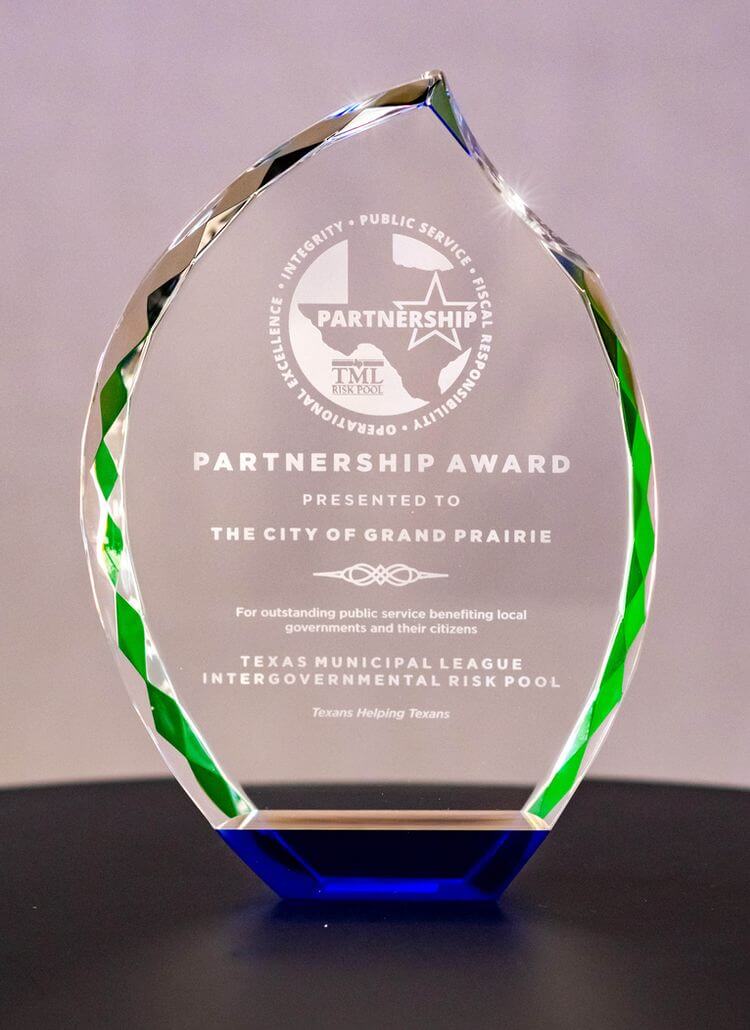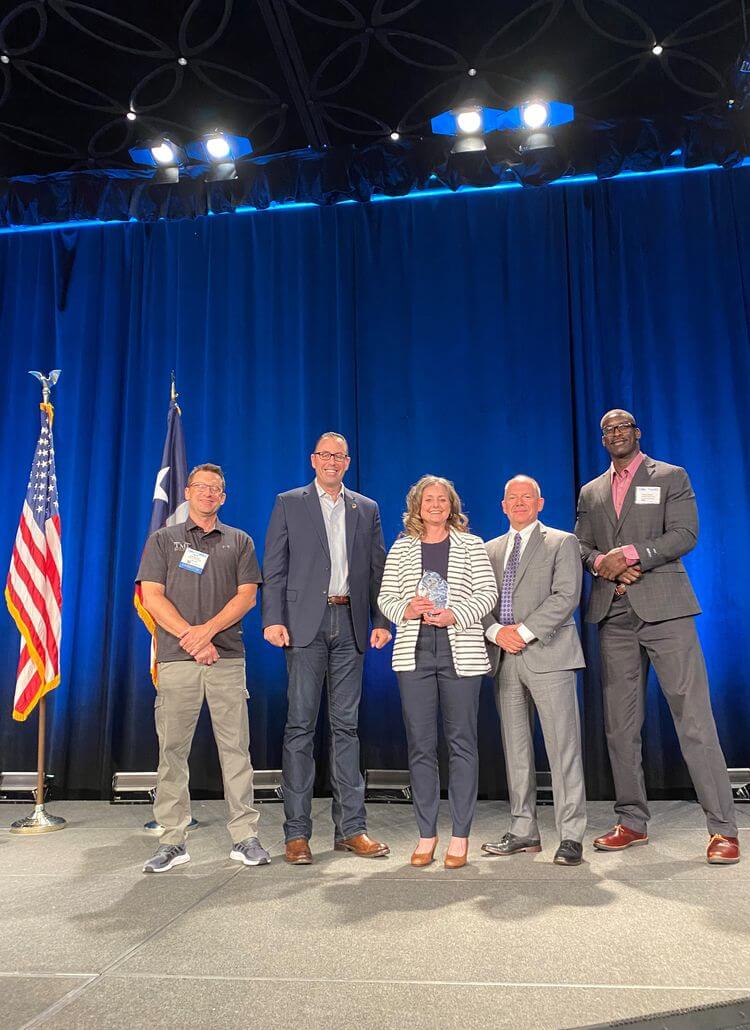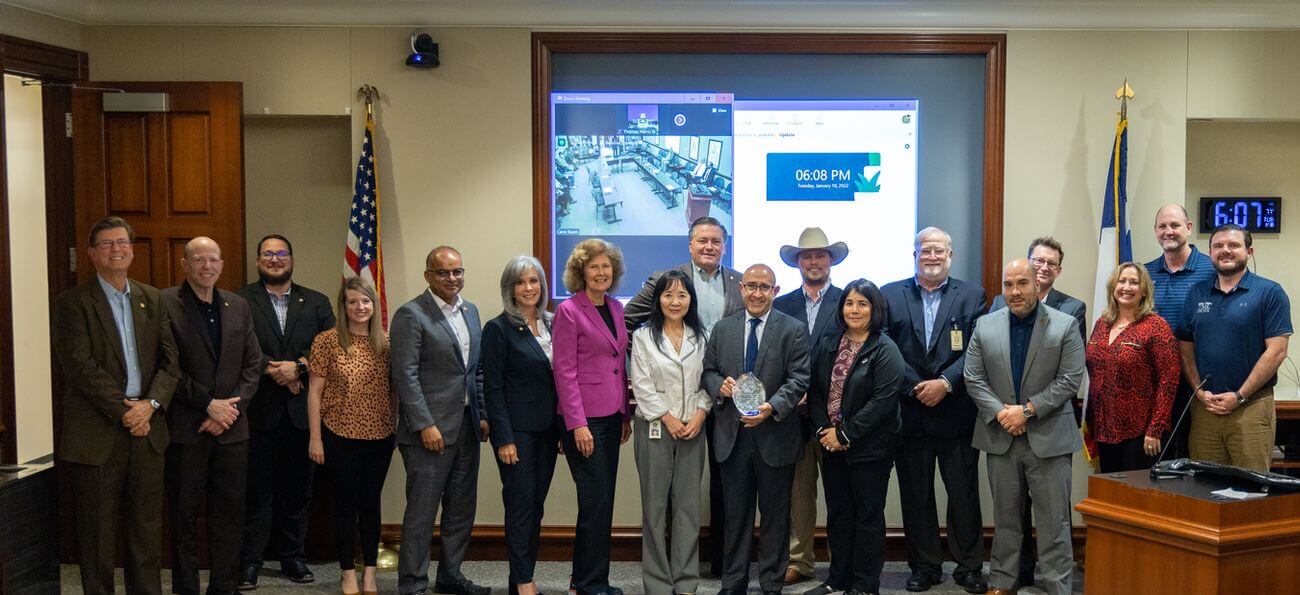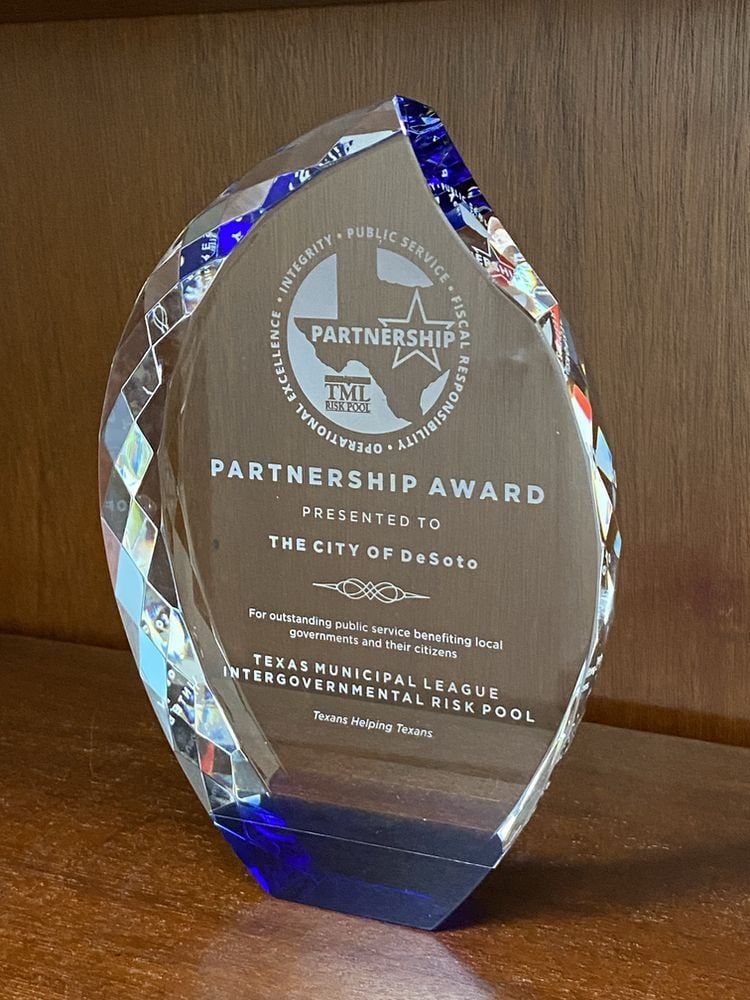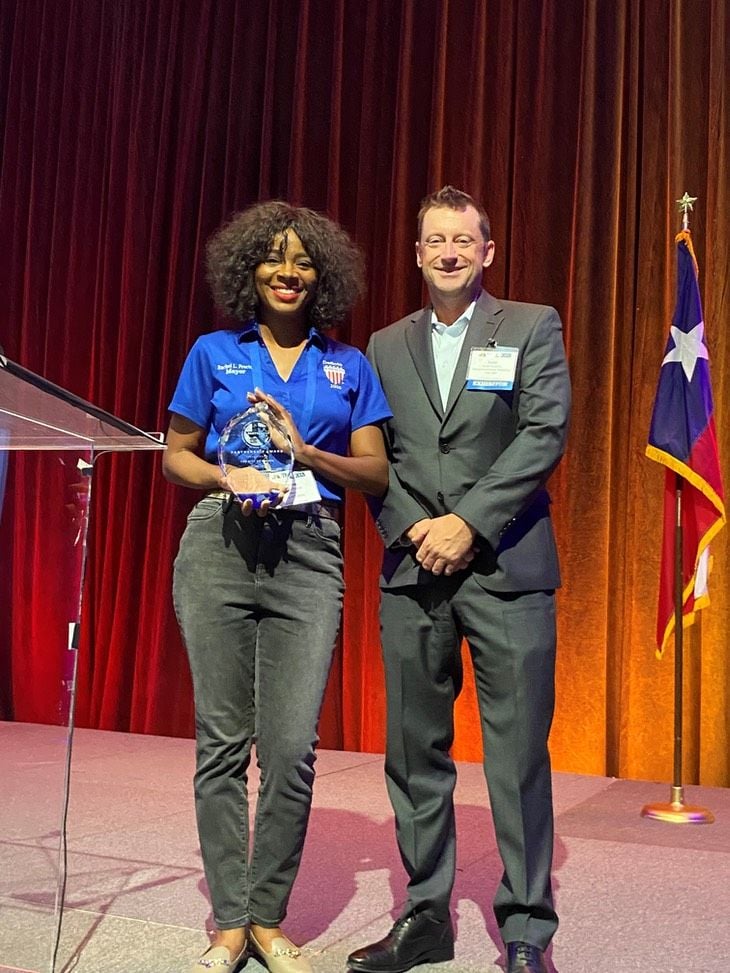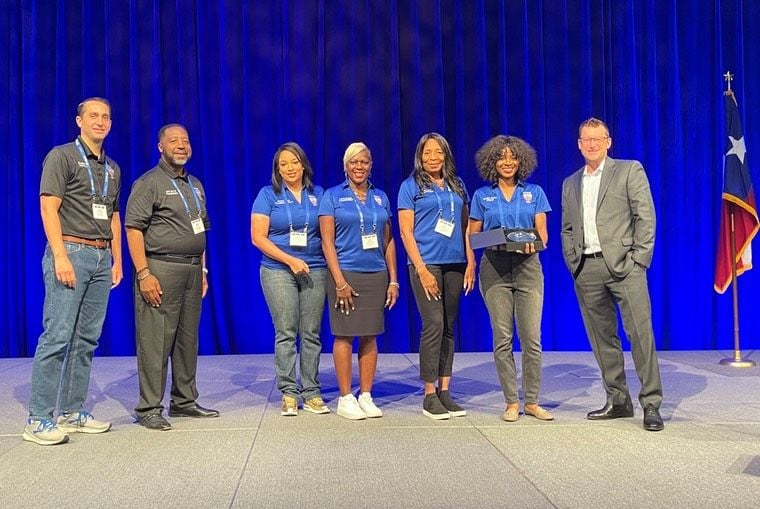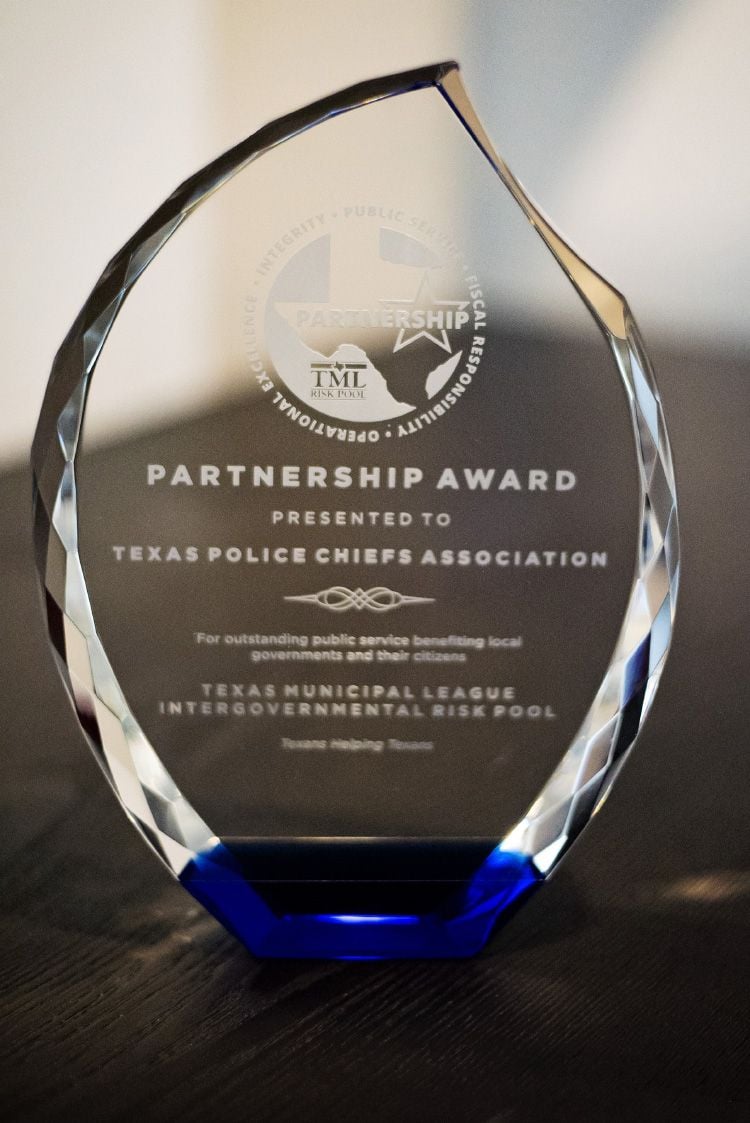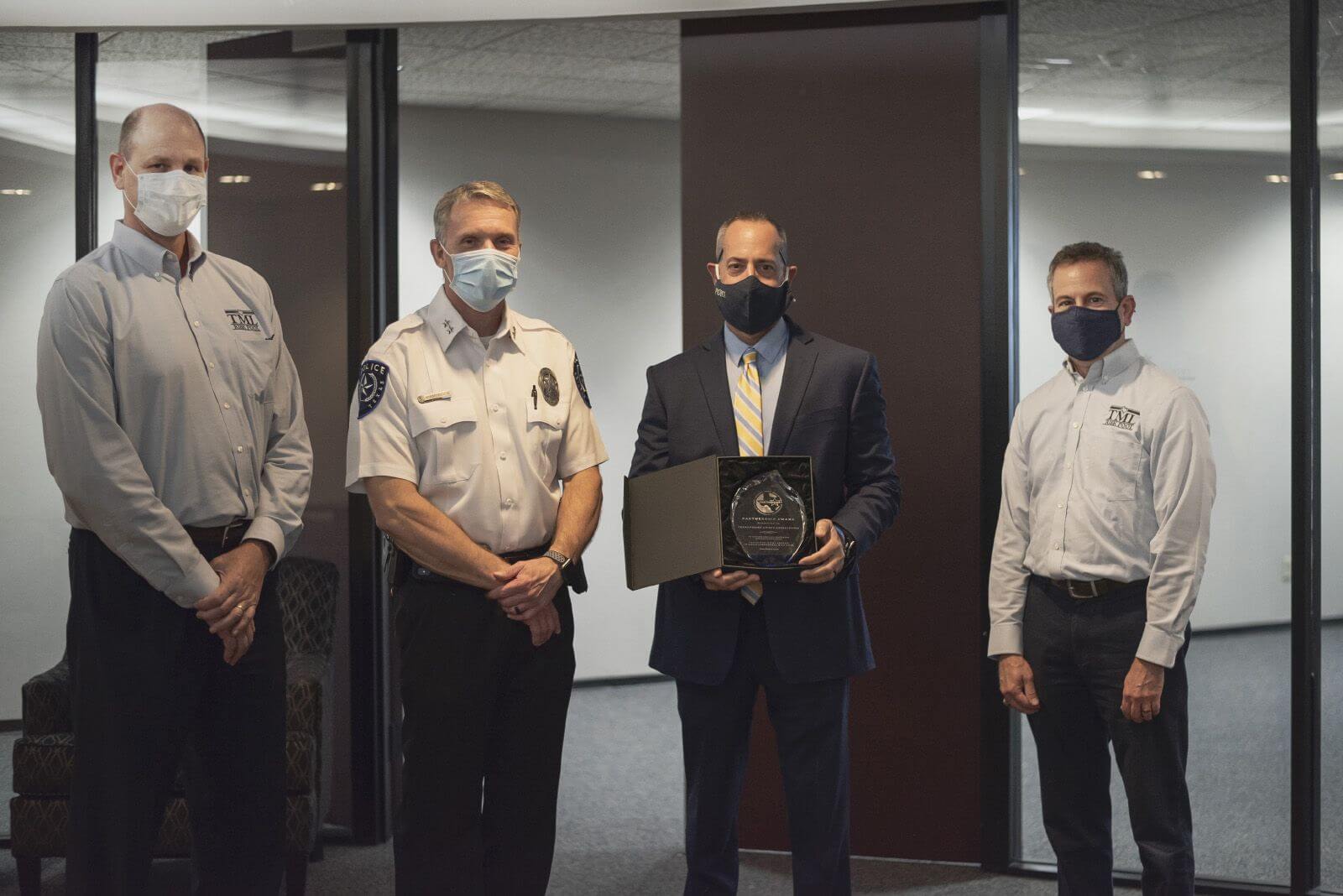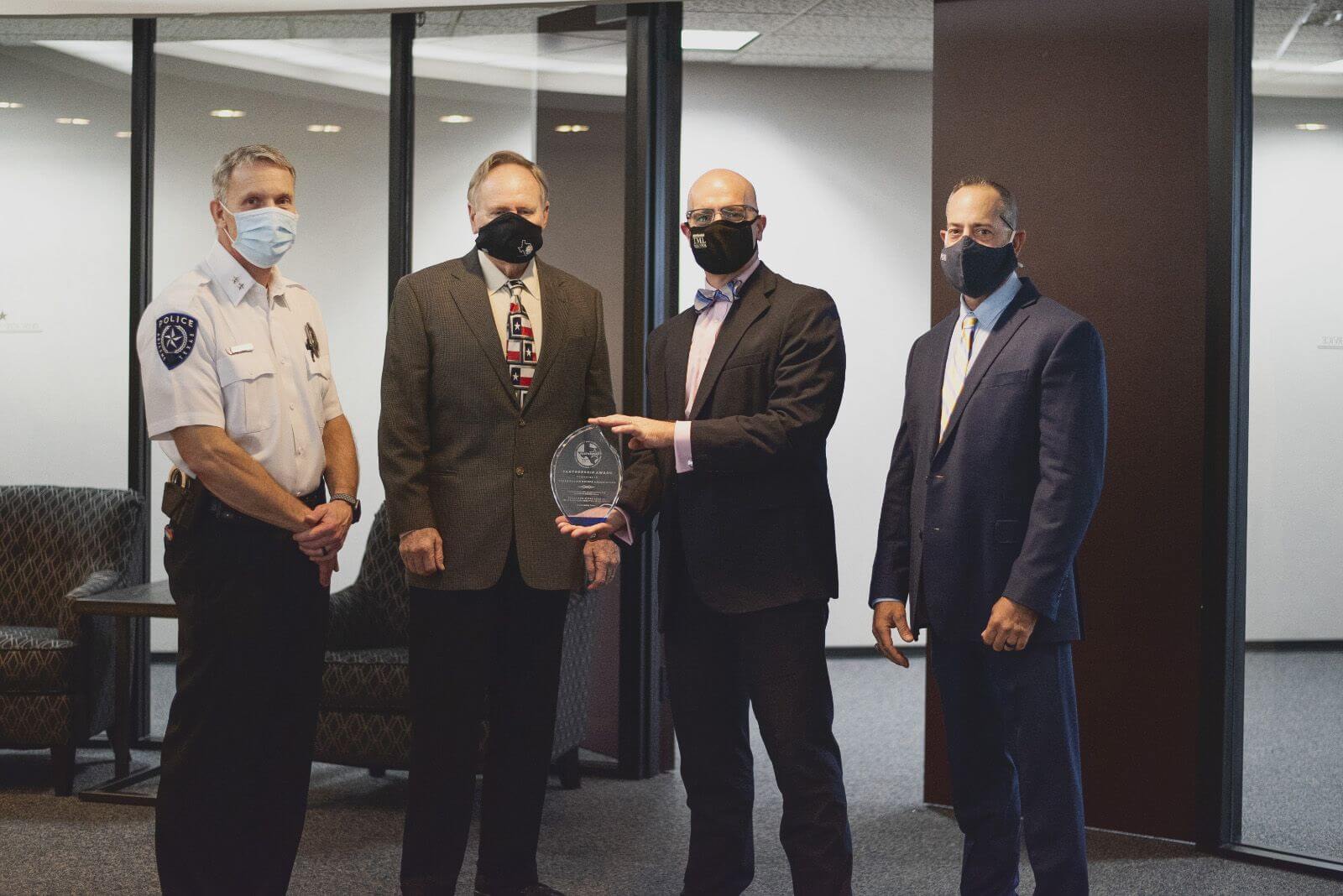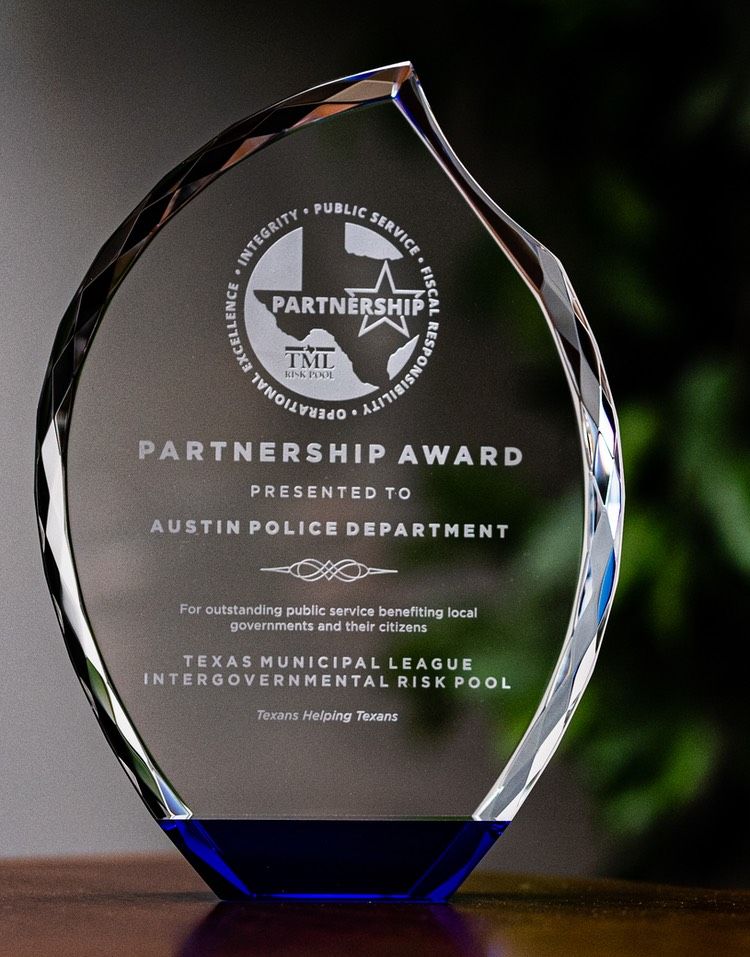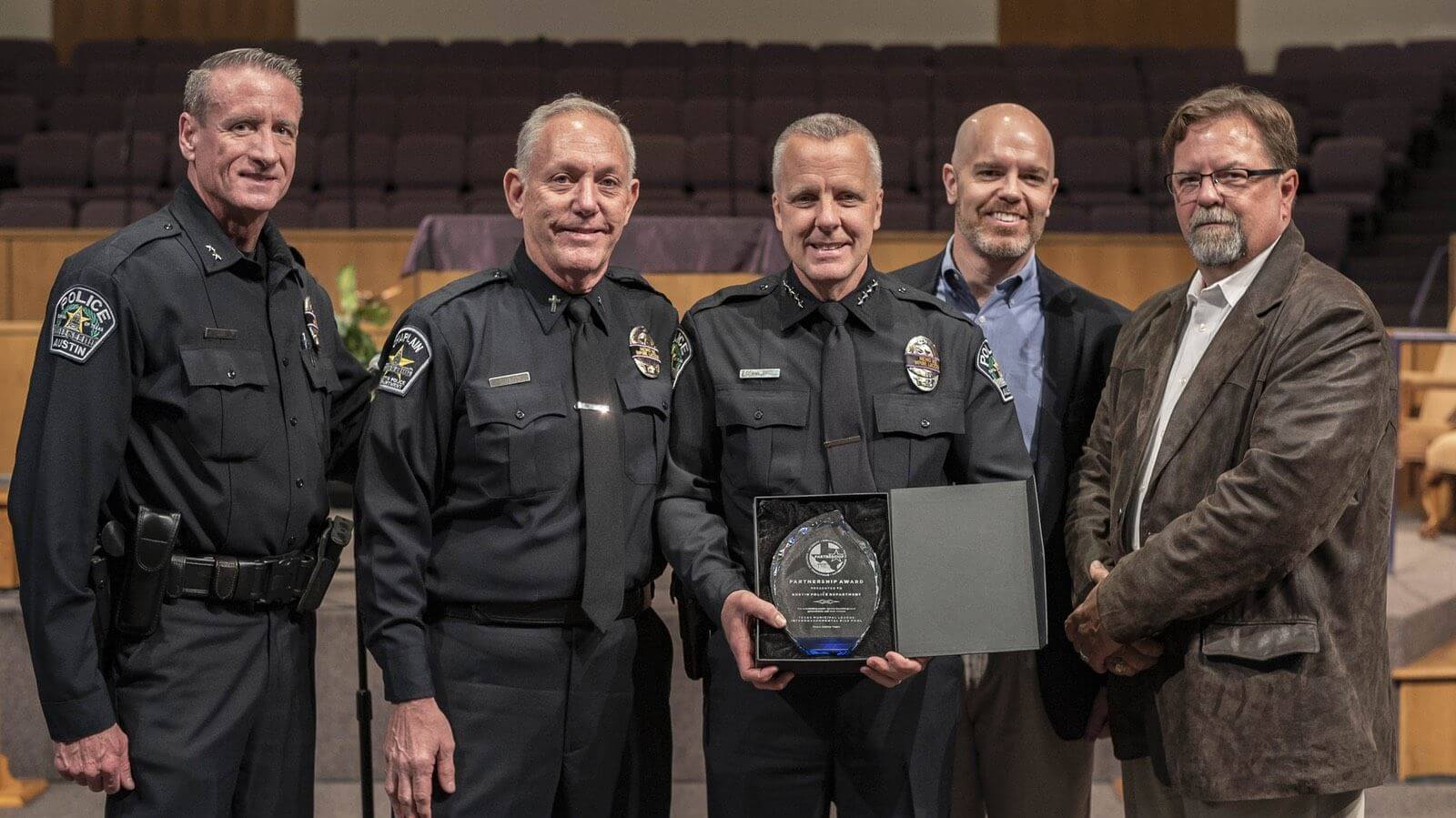Awards
The TML Risk Pool’s Partnership Award
The TML Risk Pool’s Partnership Award is presented to members who meet certain criteria and exhibit exemplary service to their communities, strengthen the bond between Pool Members, and espouse the Core Values of Integrity, Public Service, Fiscal Responsibility, and Operational Excellence.
February 4, 2025
TPCA Officer Safety Committee VINCIBLE Training Program
The Texas Police Chiefs Association’s Officer Safety Committee created the VINCIBLE training program a decade ago. According to VINCIBLE leadership, “as much as 50 percent of officer deaths in some years can be attributed to behaviors that are controllable, and VINCIBLE was created to invade police culture in a way that changes risk-prone behaviors and ultimately reduces deaths and injuries.” The foundation of VINCIBLE lies in its five cornerstones:
- Wear Your Armor (body armor, vest).
- Buckle Up (wear your seatbelt).
- Slow Down (control your speed).
- Stay Fit (physically and mentally).
- 540 (have awareness of your surroundings – 360 degrees around and 180 degrees over).
These cornerstones are communicated t hrough weekly “roll call” trainings that are created by the Officer Safety Committee and provided at no cost to participating law enforcement agencies. Over the last 10 years, the Committee has produced over 420 “roll call” training PowerPoints. Each training consists of a concise PowerPoint presentation that reviews a specific training scenario, which is frequently based on a recent real-world incident. An officer leading the day’s roll call presents the scenario to those in attendance and the group discusses appropriate responses. This simple method takes only a few minutes but can easily save lives.
hrough weekly “roll call” trainings that are created by the Officer Safety Committee and provided at no cost to participating law enforcement agencies. Over the last 10 years, the Committee has produced over 420 “roll call” training PowerPoints. Each training consists of a concise PowerPoint presentation that reviews a specific training scenario, which is frequently based on a recent real-world incident. An officer leading the day’s roll call presents the scenario to those in attendance and the group discusses appropriate responses. This simple method takes only a few minutes but can easily save lives.
The TML Risk Pool has a long-standing relationship with TPCA, and the Pool’s Loss Prevention Department has participated in TPCA’s Officer Safety Committee for many years. The partnership began to evolve in 2015, when the Pool’s Loss Prevention team provided a comprehensive report entitled “Issues Facing Law Enforcement Operations” to the Officer Safety Committee. The report identified law enforcement exposures, analyses of losses under all coverages, officer training needs, and recommended areas for improvement.
Based on the report and other interactions, the Pool began budgeting funds to support the Officer Safety Committee and its efforts to influence police culture and improve officer safety. The funding has evolved over the last decade to support VINCIBLE in the following ways: (1) preparation of the roll call trainings; (2) a VINCIBLE website; (3) special initiatives; (4) videos; (5) speaking engagements at conferences; (6) funding of promotional materials, and more.
The VINCIBLE training program clearly aligns with the Pool’s Core Values of Integrity, Public Service, Fiscal Responsibility, and Operational Excellence. Moreover, the partnership between TPCA’s Officer Safety Committee and the Pool promotes the understanding that the training provided by VINCIBLE can make a difference in the lives of officers, local officials, and citizens.
VINCIBLE meets the following selection criteria to receive the Pool’s Partnership Award:
- Significant contribution or service to the community or the Risk Pool: The VINCIBLE training is designed to teach officers the appropriate response in each situation. The program has thus far produced more than 420 roll call trainings, and each one teaches officers how to protect themselves and the citizens they serve.
- Creating resources that may be utilized by other members to address exposures: TPCA’s Officer Safety Committee makes the VINCIBLE roll call trainings available to any department, free of charge. That means any Risk Pool Member can access and learn from them.
- Exhibits one or more of TMLIRP’s Core Values: VINCIBLE training is designed to help officers make the best decision in any of the roll call scenarios, which exhibits all of the Pool’s Core Values. By way of example, VINCIBLE is based on promoting integrity because the training is designed to help officers make safe and ethical real-world decisions.
TPCA’s Officer Safety Committee was publicly recognized with a commemorative plaque at the Texas Police Chiefs Association Annual Conference in Galveston and the Risk Pool breakfast at the 2025 TML Annual Conference and Exhibition in Fort Worth.
October 10, 2024
City of Laredo opioid Overdose Prevention Efforts
The TML Risk Pool recognizes the City of Laredo for its drug overdose prevention and response efforts. In 2008, the City Council created the Laredo Drug and Alcohol Commission, which includes members from the City and Webb County, and which has the following mission statement:
To create awareness policies and services that will serve youth, adults and families in need of alcohol and drug abuse prevention.
Since its inception, the Commission has achieved the following goals:- Created a Resource Directory for Substance Use Services.
- Established the Recovering Our Opportunities Through Strength (ROOTS) Detoxification and Recovery Facility, which is the first facility of its kind in Laredo. (Those seeking similar services in the past had to travel over 150 miles to get them.)
- Provided educational awareness for drug and alcohol prevention through a Facebook page.
- Developed a standing coalition of providers to advocate for substance use awareness.
The City also supports a local nonprofit called “People with Ideas of Love, Liberty, Acceptance, and Respect (PILLAR),” which has — among many other things — installed “harm reduction vending machines” throughout the city. The machines contain free Narcan, Fentanyl tests, and personal hygiene kits.
Laredo Police Chief Miguel Rodriguez said this is all part of their task force initiative that started in 2022. This task force combined several local, state, and federal agencies to help prevent deaths.
The Partnership Award recognizes members for their performance, and satisfying at least these three criteria bears out the City of Laredo’s worthiness for the Award:
- Significant contribution or service to the community or the Risk Pool: The City’s efforts help prevent and respond to opioid and other addictions and drug overdoses are designed to stop drug addiction before it begins and respond to those in need, including a GIS map of the number and location of overdoses, as well as a map showing public access Narcan vending machine locations.
- Exhibits one or more of TMLIRP’s Core Values: The Laredo Fire, Health, and Police Departments established the “Overdose Think Tank” comprised of representatives from various agencies and organizations across the city of Laredo to convene periodic meetings to tap into the expertise and perspectives of valued partners. This exhibits the Core Value of Operational Excellence.
- Creating resources that may be utilized by other members to address exposures: The City’s actions can be replicated by others to address alcohol and drug problems. A PowerPoint presentation shows some of the City’s efforts, which include the following:
- The Laredo Fire Department established an Opioid Response Team to conduct follow-ups on suspected overdose 911 calls and provide community outreach to local schools.
- The “Overdose: One Word. Many Lives.” And “Streetguard” campaign brings awareness about overdose, substance abuse, and mental health.
- A “One Pill Can Kill” Townhall Meeting, in which the Drug Enforcement Administration and the City co-hosted a meeting to address the rising number of fentanyl poisoning and overdose deaths in Laredo. The event aimed to raise awareness, provide education, and mobilize community action in response to the alarming increase in overdose/poisoning deaths related to fentanyl.
October 5, 2023
City of Mesquite: Blocker 4 Accident Scene Attenuator Truck
The TML Risk Pool recognizes the City of Mesquite for the fire department’s effort to protect first responders from distracted drivers using a truck-mounted “attenuator,” i.e., crash barrier.
The new unit, called Blocker 4, provides a two-sectioned bumper between the vehicle and oncoming traffic when fully unfolded. In addition to providing a barricade for emergency responders and tow operators working the accident, the Scorpion-brand attenuator is designed to withstand crashes from passing motorists and to absorb most of the blow if struck.
Blocker 4 will operate out of Station 4 and will be used for emergency responses in Mesquite on Interstates 635, 20, 30, and U.S. Highway 80. The new equipment was purchased using grant funds, and the City purchased the 25-foot T270 Kenworth truck for $120,000, approved by city council over a year ago.
The Partnership Award recognizes members for their performance, and satisfying at least these three criteria bears out the City of Mesquite’s worthiness for the Award:
Significant contribution or service to the community or the Risk Pool:
Firefighters and other first responders responding to accident scenes are under constant threat of being struck by distracted or impaired drivers. Safety of first responders is paramount and the prevention of a single serious injury or death can — in addition to avoiding all the pain that comes with an injury or death — save millions of dollars in medical care and/or indemnity benefits.
Exhibits one or more of TMLIRP’s Core Values:
The deployment of the attenuator truck exemplifies “Public Service” by protecting citizens from crash injuries should they fail to stop for an accident scene, “Fiscal Responsibility” by implementing a system partially funded with grant monies to avoid unnecessary claims, and “Operational Excellence” through the implementation of the program.
Creating resources that may be utilized by other members to address exposures:
Many members have implemented similar programs.

October 6, 2022
City of Grand Prairie Police Department's Crisis Support Unit
The Texas Municipal League Intergovernmental Risk Pool is recognizing the efforts of the City of Grand Prairie Police Department to provide mental health resources for citizens in need. The Department’s Crisis Support Unit (CSU) consists of two licensed mental health clinicians and two police officers.
Through collaborative community relationships and intensive training, CSU improves communication, identifies mental health resources for those in crisis, and ensures officer and community safety.
When police are dispatched to a call that includes a mental health concern, the CSU also responds. A clinician will arrive on-site to help with de-escalation measures if necessary. The clinician then evaluates whether the person should go to a mental health facility in lieu of jail. The goal is to divert people with mental health issues away from jail and into treatment. The City’s homeless population is a frequent beneficiary of the service. The CSU follows up the same week to check on the citizen and provide support if needed.
In January 2022 alone, the CSU performed 200 follow-ups.
In addition to on-scene evaluations and follow-ups, the CSU provides training to officers on crisis intervention, de-escalation techniques, and other specialized areas of mental health, with the goal of teaching officers to independently interact with persons in crisis. Please view the CSU’s webpage for further information on the program.
January 17, 2022
City of Sugar Land: Integrated Stormwater Management Model Map
This award recognizes the efforts of the City of Sugar Land to protect its residents from flooding using state-of-the-art, real-time ponding monitoring and notifications. (“Ponding” is the unwanted accumulation of water typically in flat areas and/or roadways.)
During rainfall events, different areas of the city may experience different levels of ponding. According to the City, the Integrated Stormwater Management Model (ISWMM) map aims to serve as an informational tool that provides real-time city ponding levels during rainfall events.
The ISWMM system is connected to 28 rain/stream gauges across the City that report real-time information that is used to create ponding maps, including street ponding depths. The system gives:
- public access to real-time ponding information;
- the ability to send notifications about ponding, street flooding, and potential street closures;
- assistance in the planning of evacuation routes; and
- assistance in evaluating current drainage infrastructure to more efficiently target drainage improvements.
A video is available on the City’s ISWMM web page, where Senior Engineer Manager, Jorge Alba, provides an overview of ISWMM and why it’s such an innovative tool that helps keep the community safe.
October 7, 2021
City of DeSoto: COVID-19 Vaccines
City of Desoto, Texas, staff stepped up to help elderly and other residents navigate the COVID-19 vaccination process. In February 2021, when the vaccine rollouts began, DeSoto city staff recognized that its residents needed help, especially its elderly African-American residents.
Desoto is in Dallas County, and the county’s registration process — when it first began in February 2021 — was only done online. That made it difficult for many older residents, especially those in poorer communities.
Dianca McGhee, the DeSoto senior center’s manager, took action to help. She published vaccination details in the center’s weekly printed newsletter, which is delivered by workers along with hot meals to homebound seniors. And she offered her staff to help any senior get who didn’t have the technical skills or internet access get registered.
On any given day, four or five senior center employees stood ready in a makeshift call center to register anyone over the phone. They also hosted a sign-up event at the senior center.
Up the street at the city’s library, all 15 librarians were trained to enroll residents in person or over the phone. These contributions align with the Pool’s Core Values of Integrity, Public Service, Fiscal Responsibility, and Operational Excellence.
The Pool proudly presented the award to the City at the Texas Municipal League Annual Conference and Exhibition in Houston on October 7, 2021.
October 21, 2020
Texas Police Chiefs Association
The Texas Municipal League Intergovernmental Risk Pool has a longstanding, cooperative relationship with the Texas Police Chiefs Association. This partnership has created resources that can improve law enforcement operations and reduce to auto accidents, liability claims, post-traumatic stress, injury, and — sometimes — line-of-duty deaths. These efforts align with the Risk Pool’s Core Values of Public Service, Fiscal Responsibility, Operational Excellence, and Integrity.
TPCA General Counsel/Executive Director James McLaughlin is the primary contact with the Pool and he coordinates access to the association’s various committees that provide resources that benefit Risk Pool members. Primary resources include the Law Enforcement Agency Best Practices Recognition Program and the VINCIBLE Program. Descriptions of these programs follow:
The Law Enforcement Agency Best Practices Recognition Program was established in 2006 through the efforts of a committee of police chiefs from across Texas. While similar to a national accreditation program, the TPCA Foundation’s Best Practices Recognition Program is easier to administer, lower in cost, and designed specifically for Texas law enforcement agencies. TMLIRP has long-supported this program by funding first-year fees for member law enforcement agencies. The development and implementation of comprehensive policies and procedures from a reputable source is a goal for any law enforcement agency that is a member of the Risk Pool, and this process provides direction and focus to make it happen. The program is led by Chief Max Westbrook, Jr. (Ret.) and has been supported by diligent volunteers and staff over the years, particularly Chief Marlin Price (Ret.).
The VINCIBLE program was created by the TPCA’s Officer Safety Committee in 2015. During one of the committee’s initial discussions about the needed paradigm shift in relation to officer safety, someone offered that “officers need to realize they are not invincible… they are vincible.” This discussion led down a long road to the five VINCIBLE cornerstones that laid the foundation for the committee’s efforts to improve officer safety in Texas. The five cornerstones are: Wear your Armor, Wear your Belt, Slow Down, Stay Fit, and 540 (540 degrees of awareness – 360 around you and 180 vertically).
The Officer Safety Committee has produced over 250 weekly PowerPoint “roll call trainings” (and still counting) since the effort began. That’s more than five years without a missed week. Roll call trainings support TPCA Best Practices, relate to current needs, address recurring exposures, are readily available, and are designed to be conducted in less than 10 minutes. VINCIBLE has a stand-alone website where the entire catalog of roll call training is available for download. A video about the program is also available on the website. Law enforcement agencies need not be a member of TPCA to participate in the VINCIBLE process. This is an important note as many Risk Pool member law enforcement agencies are not members of TPCA. The Pool recognizes the TPCA Officer Safety Committee's efforts and results, with leadership from Chief Stan Standridge of the Abilene Police Department, and contributions from police leaders across Texas.
The TMLIRP and Texas Police Chiefs Association partnership has delivered functional and appropriate benefits to Texas police agencies. TMLIRP recognizes the TPCA leadership, staff, committees, and volunteers for their contributions to law enforcement professionals.
January 27, 2020
City of Austin Police Department: Treating PTSI in First Responders
A partnership is a chain. A single link does no good in keeping the coyotes out of the chicken coop or marking a Friday night first down, and it takes each unit working harmoniously under tension to drag an axle-deep pickup truck out of East Texas clay. Celebrating the strong links is long overdue. It is with great pride that TMLIRP presents the inaugural Partnership Award to the Austin Police Department for its tireless approach to treating Post-Traumatic Stress Injuries (PTSI) in first responders.
PTSI: Defining the Problem
PTSI affects nearly 8 million Americans on an annual basis, many of whom call the Lone Star State home. Due to the nature of their various backgrounds and the chronic stress and trauma experienced in their line of work, first responders are particularly susceptible to a litany of deleterious physical problems like poor sleep and weight gain. Left untreated, PTSI can result in anger management issues, substance abuse, divorce and even suicide.
But behind every badge, there’s a son or daughter. Behind every stoic facade there’s a volunteer t-ball coach, a BBQ whiz or someone with a tall fishing tale. Those suffering from PTSI are often people at their very finest, struggling in silence. APD Chaplain Rick Randal has seen the devastating effect PTSI has on families and communities, and he isn’t content to allow first responders to become another statistic.
“I’ve done seven funerals in my 22 years with APD,” Rick recalls solemnly. “When we started digging deeper, we noticed that we give our guys tools like a vest and a gun, but that doesn’t protect their minds or their spirits. I was doing classes on negotiating with tough supervisors and dealing with day-to-day stress, but then we started asking the bigger questions about cumulative mental trauma.”
A Passion for Outreach
From there, the problem was more clearly defined, and by partnering with TMLIRP, APD began developing relationships and establishing a network of concerned communities, united in their commitment to first responder outreach. Rick has also led nearly 30 Resiliency Strategies for First Responders courses all over the state.
“It’s been revolutionary to connect therapists and risk management professionals in a strategic partnership, all with the same goal of getting people treatment early so this isn’t a lifelong debilitating situation,” Rick says. “I’m blessed because working with officers and their families is my passion. That’s why I’m still doing this at 68 — until I go horizontal.”
Concerned advocates have their work cut out for them. It’s estimated that 30 to 40% of first responders suffer from PTSI, and frankly, there just aren’t enough Rick Randals to go around. However, by leveraging APD’s experience with TMLIRP resources, and embracing cutting-edge treatment methodology, the future of PTSI treatment for first responders in the state of Texas looks promising.

